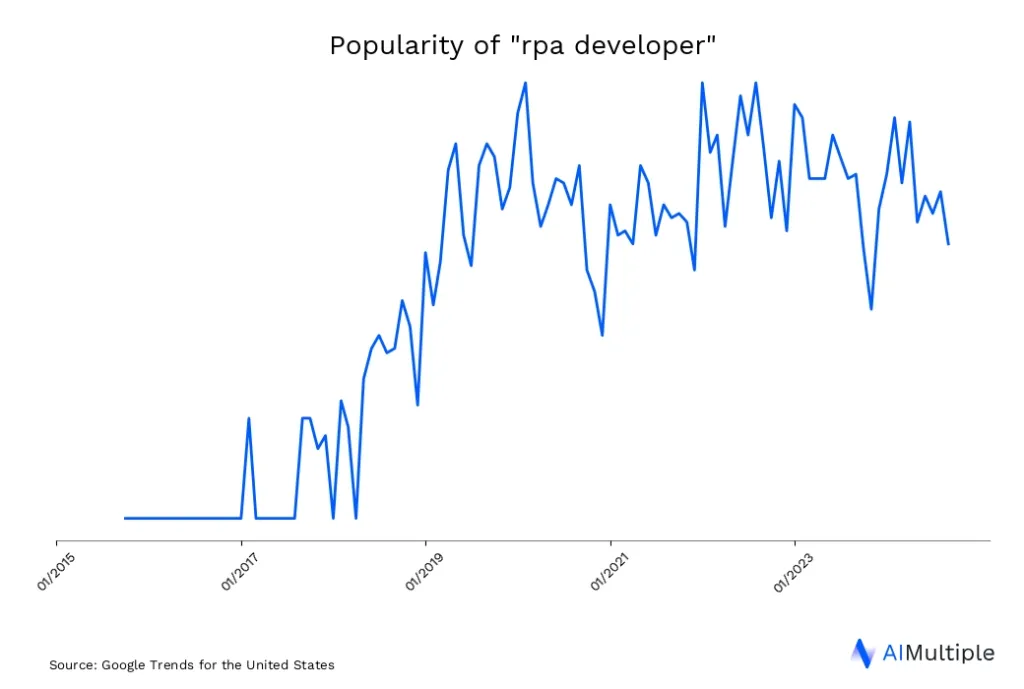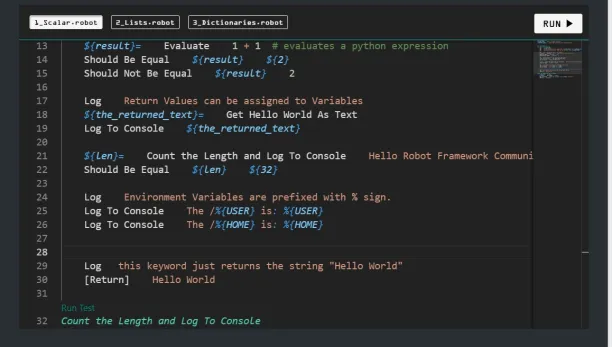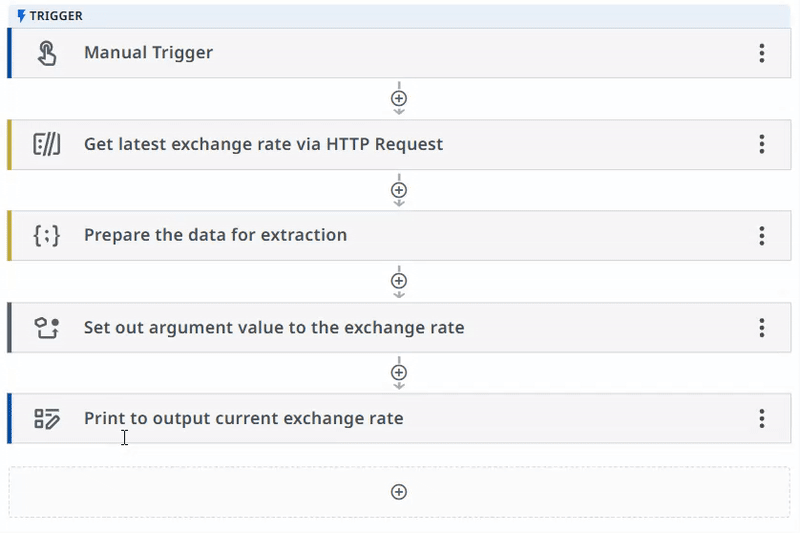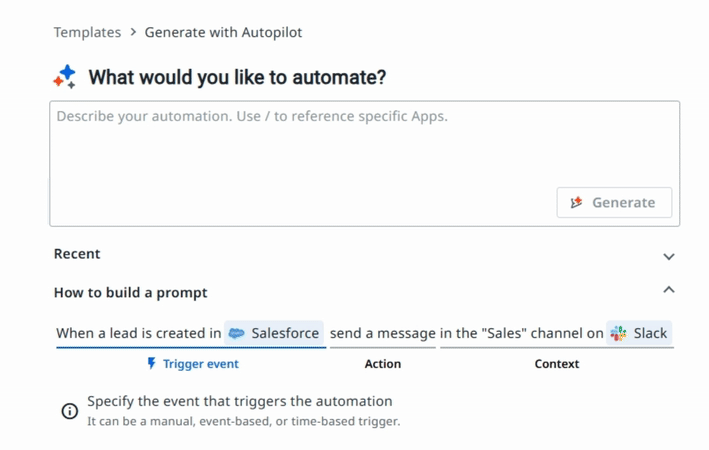Although plenty of resources online about RPA skills and training exist, job seekers still struggle to understand where to start.
We’ve compiled the most comprehensive resource on RPA developer skills, salary, and jobs to help job seekers explore where to start and what they need to do to excel as an RPA developer.
RPA developer career
- An RPA developer is a software team member who focuses on designing automation bots.
- RPA developers use skills from software development, business analysis, and project management.
- They are responsible for programming the actual bots or designing the ecosystem for automation tools.
- RPA developers design, develop, and implement RPA systems using tools such as UiPath, Automation Anywhere, Blue Prism, UI Automation, etc.
- They set up and analyze automated business tasks.
Essential skills for RPA developers
- Analytical skills are required for business analysis and problem-solving.
- Problem-solving skills are essential for identifying opportunities for automation.
- Strong communication skills are necessary for efficient communication between stakeholders.
- Understanding UX principles is required for RPA software.
- Basic logical reasoning skills, such as loops, if/else statements, variables, and handling exceptions, are necessary.
- Basic programming knowledge helps, but is not always required. Cloud technology knowledge also helps.
- Patience is key, as challenges may arise during the automation process.
Who is a robotic process automation developer?
An RPA developer is a specialist who creates RPA bots to automate manual workflows. However, they should first understand which manual processes are slowing down the companies the most and warrant automation. The developer is responsible for:
- Drawing flow diagrams of the manual business processes,
- Understanding the nature of the process,
- Interviewing employees to understand their opinions on the main points,
- Designing, implementing, and troubleshooting the bot,
- Maintaining the performance of the bots.
Explore processes that are suitable for RPA automation, and processes that are ill-suited for RPA automation.
What are the responsibilities of an RPA developer?
1. Analyzing
An RPA developer should first analyze the manual process the company presents them with to find automation opportunities. Process improvement tools, such as process mining and/or process mapping, and strategies, such as process workflow generation, can help visualize and document how the manual processes are carried out in real life. This will assist in pinpointing areas that could benefit from automation.
A developer could also conduct a survey of employees involved in the soon-to-be-automated manual processes, which tasks take the most to complete, and the reason why.
RPA consultants can also advise the developers on which processes are realistically automatable.
2. Developing
The developer is then tasked with designing a bot that specifically mitigates the challenges. For instance, a company might lament that the invoice issuing stage of e-commerce orders takes too long.
Therefore, the developer should create a bot that automates employees’ steps to issue an invoice. The client may want the bot to include features such as a help center for employees to resolve problems internally.
In addition, the bot should have the following standard features:
- A dashboard through which the staff can access the inner workings of the bot, monitor its performance, drag & drop commands to modify its functionality, “stop” & “start” workflows, and more.
- A physical or virtual server to house the bot on.
- The ability to contact human staff whenever it encounters an issue that it was not programmed to deal with.
3. Testing & implementing
Once the bot has been developed, it should be tested and integrated into the company’s legacy systems through API. If issues such as incorrect code, integration failures, or low efficiency occur, the developer should revisit the design to resolve these problems.
4. Maintaining
Once the bot has been tested and deemed viable for implementation, it should be monitored and maintained for some time through visible dashboards to assess its success rate, speed, compliance, and more. Developers are also responsible for resolving any future issues with the bot.
Is RPA developer a good career?
If you are undecided about becoming an RPA developer, here’s what you need to know:
1. RPA is the fastest growing enterprise technology
According to Gartner,1 RPA is the fastest-growing segment of the global enterprise software market. Unsurprisingly, interest in RPA has been steadily increasing. We summarized all major industry analysts’ estimates about the RPA market, and there is consensus that RPA will retain its momentum in the next few years.
Robotic Process Automation technology revolutionizes business processes by enabling automated systems and workflows that streamline operations. Implementing RPA software allows organizations to optimize repetitive tasks, leading to more efficient and accurate business processes.
As the RPA industry continues to grow, there is a rising demand for skilled RPA professionals who can develop and manage these automated solutions.
RPA developer jobs are increasingly sought after as businesses leverage automated workflows to enhance operational efficiency. These professionals are crucial in writing RPA software that integrates with existing systems to automate routine tasks. By adopting RPA technology, companies can significantly improve their productivity and accuracy, positioning themselves competitively in the market.
2. Learning curve for RPA software is low
RPA programming is easier to learn than most programming languages, as it is the highest-level programming language
Interestingly, we couldn’t find reliable sources for measuring learning curves for different programming languages. However, a fact of programming is that the lower a programming language is, the more difficult it is to learn and program in.
For example, no one would categorize assembly as an easy-to-learn programming language today, as it forces programmers to think about memory storage or the order in which their code will be executed at a lower level than they need to in any modern programming language.
RPA is a high-level programming language, as most of its instructions involve manipulating items on the screen, processing data, and passing data to different systems. What RPA software tends to do with a line of code would take multiple lines in most other languages.
3. Average RPA programmers tend to be paid competitively
Experience and location are the most important criteria for determining salaries for similar roles.
Glassdoor is one of the largest job post websites and provides the average salary per role. According to Glassdoor, these are the average salaries by country. We also shared top and bottom end of the ranges to give you an idea of how experience impacts salary:2
| Country | Median salary | Lowest salary | Highest salary |
|---|---|---|---|
| India | ₹550,000 | ₹435,000 | ₹798,000 |
| United Kingdom | £37,000 | £29,000 | £48,000 |
| United States | $144,000 | $116,000 | $182,000 |
| Canada | CA$76,000 | CA$64,000 | CA$92,000 |
While the wage for RPA developers is competitive, it is a bit below that of developers of other, more general-purpose programming languages.
According to Glassdoor, these are the average salaries of Python developers by country. It can be seen that Python programmer salaries are higher than those of RPA developers. You can also see the top and bottom end of the ranges to have an idea of how experience impacts salary:3
| Country | Median salary | Lowest salary ($k) | Highest salary ($k) |
|---|---|---|---|
| India | ₹498,000 | ₹322,000 | ₹911,000 |
| United Kingdom | £57,000 | £42,000 | £81,000 |
| United States | $121,000 | $100,000 | $148,000 |
| Canada | CA$86,000 | CA$68,000 | CA$108,000 |
4. Tasks are becoming more complex as machines are becoming smarter
3 factors contributed to the rise of RPA, which puts companies leveraging RPA at an advantage and pushes other companies to adapt the technology to compete effectively:
- Employees today use a larger number of tools compared to the past. It is not feasible to automate all those tools and their interactions with simple macros
- Computer vision advancements enabled automation in every enterprise setting, including remote desktops.
- Developments in artificial intelligence now enable the use of artificial intelligence in RPA bots and make it possible to automate many tasks that could not be done before.
Learn more about why RPA is relevant now.
5. RPA developer opportunities are increasing faster
Though an RPA developer is not the best paid developer, RPA is an emerging field, therefore there is a lack of qualified RPA developers in the market. This makes it easier to be hired as an RPA developer.
At the beginning of 2017, RPA development was not a keyword searched on Google in the US, while now it is searched on Google more than 1,000.

Figure 1: Interest in “RPA developer” in the US.
How do I become an RPA developer?
RPA is still an emerging industry with numerous solutions available in the marketplace. The first step in becoming an RPA developer is deciding on the platform you will use to build your skills. RPA tools achieve similar outcomes (such as backend or desktop automation), but the tool selection is important, though not critical. There are various programming options to consider, such as code-based or drag-and-drop. Basic RPA concepts are shared across tools, and having RPA certifications from various software vendors can help you progress in your career.
1. Understand RPA programming options
See different RPA programming options with their pros and cons:
| Technical Skills | Configurability | Speed of Implementation | |
|---|---|---|---|
| Code-based | High | Very high | Slow |
| Low Code / No Code | Medium | Moderate | Fast |
| Prompt-to-Automation | Low | Low | Very Fast |
| Recording | Low | Low | Fast |
Code-based
Code-based automation requires programming bots using a software language. This method involves writing all the necessary instructions for the bots to perform a specific function. It requires technical knowledge and is usually preferred by software development experts.
Example of a code-based RPA tool:

Pros:
- Full flexibility with coding (for highly customized, complex processes).
- Ideal for processes that are very specific and need a lot of customization.
Cons:
- Time-consuming and expensive to implement.
- Reliance on skilled programmers to create and maintain bots.
- As process complexity increases, the cost and time required for automation may become financially infeasible.
- Edge cases that were not anticipated may arise, requiring regular audits and adjustments.
Low code / No code
Most modern RPA vendors offer low-code and no-code solutions to program simple RPA bots with drag-and-drop interfaces. Technically proficient personnel (those who can code Excel macros) should be capable of setting up simple bots. For more technical users, these tools also offer code-based bot programming interfaces.
Pros:
- Can be used by business users or people with minimal programming skills.
- User-friendly, graphical interface with drag-and-drop features.

Cons:
- May lack certain business-specific functionalities (e.g., AI integrations or advanced customizations).
- Limited customization for specific business processes.
- Complex processes may still require coding for full automation.
Prompt-to-automation
The prompt-to-automation feature significantly simplifies the automation process, especially for those without coding expertise. It enables users to automate business processes quickly by specifying the trigger event and desired action without diving deep into complex configurations or programming.
Pros:
- Most accessible for non-technical users, minimal setup required.
- Best for repetitive, simple processes with predefined triggers and actions.
- Users can automate processes simply by specifying triggers and actions with no coding required.

Cons:
- Limited to simple, predefined processes with minimal triggers.
- Not suitable for automating complex processes or scenarios.
- Does not offer deep configuration options for customization.
Recording
Recording-based automation allows users to capture a sequence of actions performed within software applications, which the bot then translates into automated tasks. This method simplifies the process of creating automation by recording user interactions and converting them into a program that can replicate the actions. Many RPA vendors offer tools that support this recording feature, which can be useful for automating repetitive tasks that follow a defined series of steps.
Pros:
- Involves recording actions the user takes and automatically translating them into bot actions.
- Useful for simple processes that can be “captured” and replayed.
Cons:
- May encounter issues when processes change over time, requiring frequent re-recording.
- Recording complex sets of actions can be difficult and error-prone.
- Re-recording actions after even small process changes can be time-consuming.
- Difficulty handling dynamic environments or complex processes.
2. Choose your RPA platforms
RPA platforms are built on programming languages, and you can become proficient in an RPA platform faster if you are already experienced with the underlying technology
All RPA platforms have Graphic User Interfaces (GUI). Still, it helps to know the tool’s underlying technology because, especially in complex processes, developers need to customize their bots using the tool’s underlying programming language.
We can help you choose among the most popular RPA platforms based on the programming languages you are familiar with. If you are
- a Python programmer, read our article on RPA development with Python platforms
- A .NET programmer, you can start with UiPath or Automation Anywhere’s community editions, which are the most popular RPA tools
- A Java programmer, you can start with Automation Anywhere
- If you are a RPA programmer or have experience in all of these languages, you can start with any of the leading RPA providers. Almost all RPA tools have community editions. We prepared a sortable list of all RPA tools with an indication of whether they have a free trial/community edition. You can also check our article to compare RPA tools and vendors in the RPA landscape
To proceed in the platform that you chose, you have two options. If you
- Want to learn programming with RPA and learn about all RPA training/certification programs.
- Know basic programming concepts, you can start developing RPA bots straight away using these resources:
3. Start building
Most RPA software platforms provide plenty of free material to guide you through building your first bot. Here we list all such resources:
Open-source RPA solutions can also enable you to enhance your RPA development skills. And since most of them are free for both commercial and noncommercial use, you don’t have to worry about your company’s budget.
4. Get employed as an RPA developer
There are 4 types of employment opportunities for RPA developers:
1. RPA companies
Most RPA companies support companies, especially large companies, as they build bots and automate processes
2. Implementation partners of RPA companies
System integrators, professional services companies and other niche RPA consultants provide RPA development services to other companies. They use RPA software companies’ technology. These companies are the largest employers of RPA developers.
Candidates can track major companies’ (such as Big 4 and IBM) RPA developer postings from their own websites. Regarding smaller consultants, candidates should use job posting aggregators like Indeed.
3. End users of RPA
Companies using RPA to automate their own processes also rely on RPA developers. These companies typically form Centers of Excellence (CoEs) to aggregate internal RPA talent. While most of these companies do not employ large numbers of RPA developers, this category is the largest employer of RPA developers.
Since there are many companies in this category, candidates should use job posting aggregators like Indeed to track opportunities in this category
4. Other technology companies
For example, automated document processing companies leverage RPA developers while deploying their solutions to end users. This enables them to deploy their solution fast without a complex integration process.
5. Establish credibility by publishing plugins and bots
Using RPA tools to build bots is the first step in RPA development. Creating reusable and configurable solutions for the community helps build a developer’s credibility and enables the developer to monetize the RPA code base.
RPA platforms are like operating systems in that they need to integrate with a large number of different software and perform a wide variety of functions. Like operating system providers (e.g., Microsoft, Apple), most RPA platforms also rely on marketplaces to enable their ecosystem to build customized, reusable solutions. Read our up-to-date guide on RPA marketplaces to learn more.
For more on RPA
To explore RPA in detail, you can check out these articles:
- Benefits you can reap from RPA
- Our guide on RPA innovations that you can work with today, such as no-code RPA
If you are ready to start automating with RPA, feel free to use
- The best guide on selecting the right RPA software
- The most up-to-date and comprehensive list of RPA products
- Once you choose the RPA software you will work with, we have an in-depth guide for selecting an RPA implementation partner and the comprehensive list of all RPA implementation partners.
FAQ
What skills are required to become an RPA developer?
To become an effective RPA-developer, one should have strong general RPA knowledge and familiarity with programming languages. Additionally, skills in software development, strategic planning, and requirements gathering are crucial. Understanding how to design processes and deploy RPA components is also important. Supervising RPA development projects and collaborating with automation architects and process designers help ensure that the automation strategy aligns with business objectives and achieves successful results.
Are RPA certification and training programs beneficial for career growth?
Yes, RPA certification and training programs are highly beneficial for career development. By earning certifications from leading RPA tool providers, such as UiPath and Automation Anywhere, you can demonstrate your expertise in the field. These certifications increase your employability and help you secure job roles in this fast-growing field. Training programs also keep you updated with the latest technologies, making you a valuable asset to companies seeking expertise in automation software and supervising RPA development.
What is Robotic Process Automation and what are its benefits for businesses?
Robotic Process Automation (RPA) refers to the use of software robots to automate repetitive business processes. This automation reduces manual tasks and improves business efficiency by ensuring faster and more accurate results. RPA automation helps companies streamline operations, improve productivity, and lower costs. Software robots follow predefined process steps to complete tasks, contributing to a more optimized workflow. The use of automation software and RPA tools enhances business outcomes with standard solutions and simplified operations, making the entire process more efficient.
What popular technologies do companies use for RPA projects?
Companies use various RPA tools such as UiPath, Blue Prism, and Automation Anywhere to carry out RPA projects. These tools allow developers to create software bots and deploy them across business systems. These RPA components are integrated seamlessly into the RPA infrastructure of the company. They come with a user-friendly interface that makes it easier to design and monitor automated processes, ensuring smooth workflow automation and providing businesses with comprehensive automation solutions tailored to their needs.
How is Machine Learning integrated with RPA?
RPA is best suited for automating repetitive tasks, but when it comes to more complex processes, Machine Learning comes into play. As industry experts have pointed out, Machine Learning can help RPA bots adapt and improve their performance in dynamic environments. This combination is ideal for tasks that involve data analysis, predictive insights, or image recognition. Using Machine Learning alongside RPA allows businesses to develop more intelligent automation solutions that address sophisticated and constantly changing tasks.
Is it possible to automate all business processes with RPA?
RPA is not suitable for all business processes, especially those that are not repetitive or rule-based. However, RPA can be highly effective for automating tasks that follow defined process steps. By using tools like process mining, businesses can analyze existing workflows to determine which tasks are suitable for automation. Collaboration with business analysts helps identify opportunities where RPA solutions can be applied, ensuring effective automation across the entire ecosystem of the company, leading to a more streamlined and optimized operation.
External Links
- 1. Market Share Analysis: Robotic Process Automation, Worldwide, 2023.
- 2. Security | Glassdoor.
- 3. Security | Glassdoor.
- 4. https://www.argos-labs.com/videos/ Argos Labs. Retrieved from June 4, 2024.
- 5. https://academy.uipath.com/ UiPath. Retrieved from March 4, 2025.
- 6. https://forum.uipath.com/ UiPath. Retrieved from June 4, 2024.
- 7. https://www.uipath.com/developers/guides-and-resources UiPath. Retrieved from June 4, 2024.
- 8. https://university.automationanywhere.com/ Automation Anywhere. Retrieved from June 4, 2024.
- 9. https://community.automationanywhere.com Automation Anywhere. Retrieved from June 4, 2024.
- 10. https://www.automationanywhere.com/lp/community-edition-resources Automation Anywhere. Retrieved from June 4, 2024.
- 11. https://community.blueprism.com/ Blue Prism. Retrieved from March 4, 2025.
- 12. https://automationacademy.com/en Workfusion. Retrieved from June 4, 2024.

Comments
Your email address will not be published. All fields are required.